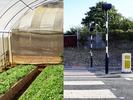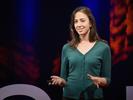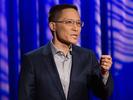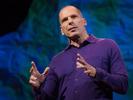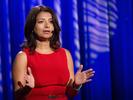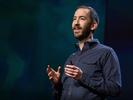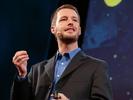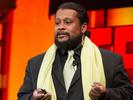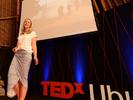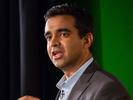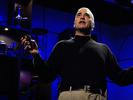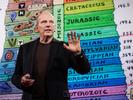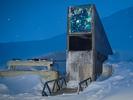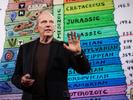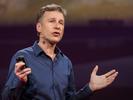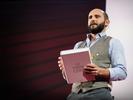NPR/TED Staff appears in the following:
How Does Food Become A Tool For Connection?
Thursday, November 17, 2016
Community leader Pam Warhurst says we can enjoy and relate to our food not only by buying it in supermarkets, but by growing it in our town's public spaces and engaging our communities.
Are We Wrong To Think We're Right?
Friday, November 04, 2016
Our biases lead us to amend the facts. Writer Julia Galef explains how we can have better judgement by developing more empathy and testing our own beliefs.
Does My Vote Really Matter?
Friday, November 04, 2016
Eric Liu says that voting is the most important thing a citizen in a democracy can do. He says when we vote, even if it is in anger, we are part of a collective creative leap of faith.
Is Capitalism Compatible With Democracy?
Friday, November 04, 2016
Yanis Varoufakis proposes a provocative idea: democracy is not compatible with capitalism. He argues corporations have gained too much control and advocates for an "authentic democracy."
Are Immigrants The Key To A Stronger Democracy?
Friday, November 04, 2016
Sayu Bhojwani urges her fellow immigrants to participate and find their own power in the political process in order to make democracy stronger.
How Can We Solve Democracy's Problems?
Friday, November 04, 2016
After immersing himself in the politics of Brazil, Canada, Indonesia, and many other countries, Jonathan Tepperman emerges with an optimistic view: democracy is remarkably pliant — and resilient.
Can A Place Still Be Home Even After Becoming Toxic?
Friday, October 21, 2016
Even thirty years after the devastating nuclear accident in Chernobyl, there are still people who call the place home. Filmmaker Holly Morris tells the stories of the mostly elderly women who stayed.
How Does Our Brain Get Rid Of Toxins?
Friday, October 21, 2016
Neuroscientist Jeff Iliff talks about his research, which explores how the brain naturally flushes out toxins during sleep.
How Do Common Chemicals Affect Frogs, Rats — And Maybe Us?
Friday, October 21, 2016
Biologist Tyrone Hayes talks about the concerning effects of the herbicide atrazine, which is part of a group of chemicals that are found in everyday food and household products.
How Do Toxins From Plastics Find Their Way Into Our Food?
Friday, October 21, 2016
Ocean advocate Emily Penn has seen first hand how much plastic ends up in the oceans. She explains how the toxins from plastic makes their way into our food chain and how we might be able to stop it.
How Can Your Home Make You Sick?
Friday, October 21, 2016
When Dr. Rishi Manchanda worked in a clinic in South Central Los Angeles, he saw that patients were getting sick because of toxic living conditions — so he tried a unique treatment approach.
What Can We Learn From One Of The World's Most Toxic Accidents?
Friday, October 21, 2016
Filmmaker Holly Morris talks about her time with the "Babushkas of Chernobyl" — the elderly women who decided to stay in Chernobyl, Ukraine, after the worst nuclear accident in history.
Are We Headed Into Another Mass Extinction?
Friday, September 30, 2016
At various times, life on earth has come close to being erased. Paleontologist Peter Ward explains what we can learn from previous mass extinctions.
How Can Dinosaurs Help Us Understand Our Own Species?
Friday, September 30, 2016
Earth's rocks and fossils can help us understand our own species. Paleontologist Kenneth Lacovara explains important moments in Earth's history that help us recognize our place in the world.
Can We Preserve Seed Diversity For The Future?
Friday, September 30, 2016
Biodiversity archivist Cary Fowler explains how the Svalbard Global Seed Vault will prepare humans for the climate change and its effect on our environment and our food supply.
How Do We Embrace All Kinds Of Nature?
Friday, September 30, 2016
Environmental writer Emma Marris wants us to broaden our definition of nature to one that embraces urban and wild spaces in order learn to protect and care for it.
What's The Anthropocene?
Friday, September 30, 2016
Have we entered a new age defined by humans? Paleontologist Kenneth Lacovara says there's "no doubt" that humans' impact on Earth will show up in the geological record.
What Data Will Be Discovered By The World's Most Powerful Telescope?
Friday, September 09, 2016
Big Data is everywhere — even the skies. Astronomer Andrew Connolly shows how large amounts of data are being collected about our universe, and how it will help lead to new discoveries.
How Do We Approach Big Data With A Critical Eye?
Friday, September 09, 2016
Collecting more data doesn't always lead to better understanding. Data analyst Susan Etlinger explains why we need to deepen our critical thinking skills as we come to rely more on big data.
Can New Technology Decode The Biggest Data Set Of All?
Friday, September 09, 2016
Scientist Riccardo Sabatini says we have the technology to read the human genome and predict things like height, eye color, age — all from a vial of blood.
